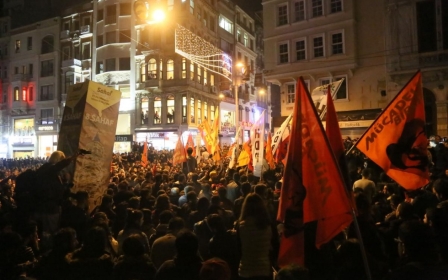Turkey allows use of airbases for military strikes against IS

Turkey has agreed to allow the use of its air bases for military strikes against the Islamic State (IS) as Kurdish fighters continue to battle the militant group in the Syrian border town of Kobane.
A senior US official also confirmed on Saturday that Ankara had agreed to train around 4000 moderate Syrian rebels in Turkey.
In spite of the concession, Turkish Prime Minister Ahmet Davutoglu lambasted the US-led coalition’s foot-dragging over the creation of a Western-backed rebel force in Syria.
“Frankly speaking, if the United States, the Western countries and Friends of Syria Group had two years ago arrived at the point that they have arrived at today and the moderate opposition had been supported, today, IS would not have had a space to use and the regime would not have the power to commit massacres”, he said.
“Here is our conviction: in Mosul, in northern Iraq, in Sunni regions of Iraq and Syria, it is only the people who can stop IS. Or else, if you try to do it via the regime, then IS’s attraction will rise, because Sunnis will ally with IS since they will give up hoping for an alternative [administration].
“Syrian people will not stand by al-Assad anymore,” he emphasised.
Turkey had already allowed the use of the Incirlik air base for non-lethal recognisance missions.
IS forces still faced heavy resistance from Kurdish fighters in Kobane on Sunday, with the People’s Protection Units (YPG) advancing fifty metres towards their headquarters which had been captured by the Islamist militants.
According to the Syrian Observatory for Human Rights, IS has poured reinforcements into the town, fearing a threat to their credibility if they fail.
"It's a decisive battle for them," Observatory director Rami Abdel Rahman told AFP. "If they don't pull it off, it will damage their image among jihadists around the world."
"They are sending fighters without much combat experience. They are attacking on multiple fronts but they keep being repulsed, then countering and being pushed back again."
Though international media has focused on Kobane as a locus for the fight against IS, US Secretary of State John Kerry has said that the town did not “define the strategy” for the fight against the militants.
“Kobane is one community and it is a tragedy what is happening there. And we do not diminish that," Kerry said, speaking at the Gaza conference in Cairo.
"But we have said from day one that it is going to take a period of time to bring the coalition thoroughly to the table to rebuild some of the morale and capacity of the Iraqi army. And to begin the focus of where we ought to be focusing first which is in Iraq. That is the current strategy."
Kerry’s comments provoked a flurry of outrage on social media, who interpreted his words as a tacit admission that the coalition was willing to surrender Kobane to IS.
In Cairo on Sunday, UN Secretary General Ban Ki-Moon said action was needed to prevent a “massacre” in Kobane.
"Thousands of lives are at stake. I once again call on all the parties to stand up to prevent a massacre of civilians in Kobane," Ban said.
Though there have been a number of coalition airstrikes against the Islamic State in Kobane, PYG forces were warned that more needed to be done.
'We have a problem, which is the war between houses, 'Esmat Al-Sheikh, head of the Kobane defence council, said on Sunday referring to the difficulties of fighting street-to-street battles in the town.
'The air strikes are benefiting us, but Islamic State is bringing tanks and artillery from the east. We didn't see them with tanks, but yesterday we saw T-57 tanks,' he added.
At least 37 people have been killed during protests by Kurds in Turkey over the government’s inaction.
Various clashes have been reported between supporters of the YPG’s parent organisation, the Kurdistan Workers Party (PKK), far-right Turkish nationalists and pro-IS Islamists.
According to Hurriyet Daily News, the majority of deaths resulted from “police, the military, far-right fundamentalists or far-right nationalists” attacking crowds of Kurdish protests.
Stay informed with MEE's newsletters
Sign up to get the latest alerts, insights and analysis, starting with Turkey Unpacked
Middle East Eye delivers independent and unrivalled coverage and analysis of the Middle East, North Africa and beyond. To learn more about republishing this content and the associated fees, please fill out this form. More about MEE can be found here.




